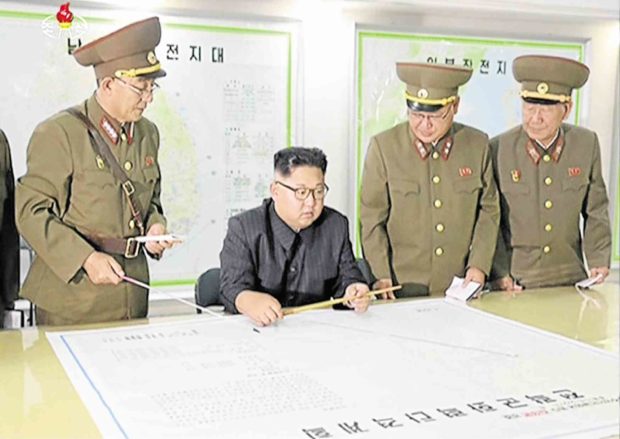
BRIEFING North Korean leader Kim Jong-un is briefed on the military’s plans to launchmissiles
toward waters near Guam in this video image. —KRT VIA AP
HAGATNA, GUAM—Guam officials were “ecstatic” on Tuesday as North Korea appeared to back away from its threat to fire four missiles toward the US territory in the western Pacific.
“There doesn’t appear to be any indication, based on what we’re hearing, that there will be any missiles attacking in the near future or in the distant future,” Lt. Gov. Ray Tenorio said.
Guam Homeland Security adviser George Charfauros dismissed reports of satellite images showing North Korea moving a missile into place for a possible launch.
He said he believed this was “just a show of force” to mark North Korea’s Liberation Day celebrations on Tuesday.
“It may be just a ruse. Today is a historic day for the Korean Peninsula. It is their Liberation Day … North Korea tends to use symbolism as part of their decision making,” Charfauros said.
“We are almost ecstatic that (North Korean leader) Kim Jong-un has backed off,” he added.
CNN reported that US spy satellites detected a North Korean mobile missile launcher being moved in a way indicating preparations were being made for a possible launch.
But tensions began to ease in Guam after Pyongyang’s official Korean Central News Agency (KCNA) reported that Kim had examined plans to fire missiles near Guam, but made no move toward an immediate strike.
‘Watch a little more’
KCNA said Kim was briefed on the “plan for an enveloping fire at Guam” during an inspection on Monday of the Strategic Force command in charge of the nuclear-armed state’s missile units.
But Kim said he would “watch a little more the foolish and stupid conduct of the Yankees” before executing the order.
If they “persist in their extremely dangerous reckless actions on the Korean Peninsula,” then North Korea would take action “as already declared,” he was quoted as saying.
“In order to defuse the tensions and prevent the dangerous military conflict on the Korean Peninsula, it is necessary for the US to make a proper option first,” he added.
US-South Korea drills
Kim’s remarks would appear to bring into play the large-scale military exercises held every year by South Korea and the United States that are expected to kick off later this month.
The North has always denounced the drills as provocative rehearsals for invasion and has in the past offered a moratorium on further nuclear and missile testing in exchange for their cancellation—a tradeoff promoted by Pyongyang’s main ally China, but repeatedly rejected by Washington and Seoul.
Some analysts said Kim was seeking a similar quid pro quo this time around, using the Guam missile threat as leverage.
“This is a direct invitation to talk reciprocal constraints on exercises and missile launches,” said Adam Mount, senior fellow at the Center for American Progress.
John Delury of Yonsei University in Seoul said Kim was “deescalating, putting Guam plan on ice”—at least for now.
“We are not out of the woods. Both sides need to keep taking steps to deescalate in words and deed. Diplomacy needs to go in high gear,” he added.
Defensive
The United States and South Korea insist their annual joint exercises are purely defensive and cannot be linked to the North’s missile program, which violates a host of UN resolutions.
Tenorio said Kim appeared to have “calmed down” some of his rhetoric and “we’re happy that he has taken a look at their plans and will be holding off on, at least it appears, the imminent threats to Guam.”
“At this point, our government is operating, our tourism is continuing to grow, there have been no major changes in our forecast,” he added.
Tensions have been mounting in the region since North Korea tested two intercontinental ballistic missiles last month, which appeared to bring much of the United States within range.
Responding to the tests, US President Donald Trump warned Pyongyang of “fire and fury like the world has never seen.”
The North replied by setting a mid-August deadline to finalize plans to test-fire its missiles toward Guam.
Although tensions have eased in Guam, which is home to two large US military installations and more than 6,000 military personnel, Tenorio said there was no change to the threat level.
“I think the rhetoric is one thing but if we have any belief, as a country or as an island, that there is going to be a threat, we are going to be prepared. We are going to be ready for it,” he said.